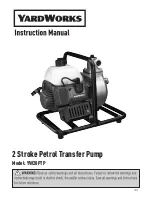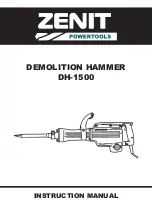
3
1. Read and understand this entire manual before attempting assembly or operation.
2. Read and understand the warnings posted on the tool and in this manual. Failure to comply with all of
these warnings may cause serious injury.
3. Replace the warning labels if they become obscured or removed.
4. This ratchet wrench is designed and intended for use by properly trained and experienced personnel
only. If you are not familiar with the proper and safe operation of an air-operated ratchet wrench, do
not use until proper training and knowledge have been obtained.
5. Do not use this tool for other than its intended use. If used for other purposes, WMH Tool Group
disclaims any real or implied warranty and holds itself harmless from any injury that may result from
that use.
6. Always wear approved safety glasses/face shields while using this ratchet wrench. (Everyday
eyeglasses only have impact resistant lenses; they are
not
safety glasses.)
7. Wear ear protectors (plugs or muffs) if the noise exceeds normal levels.
8. Use gloves if needed when operating the ratchet wrench. Keep hands and body away from the
working area of the tool.
9. Some dust created by power sanding, sawing, grinding, drilling and other construction activities
contains chemicals known to cause cancer, birth defects or other reproductive harm. Some examples
of these chemicals are:
•
Lead from lead based paint.
•
Crystalline silica from bricks, cement and other masonry products.
•
Arsenic and chromium from chemically treated lumber.
Your risk of exposure varies, depending on how often you do this type of work. To reduce your
exposure to these chemicals, work in a well-ventilated area and work with approved safety
equipment, such as face or dust masks that are specifically designed to filter out microscopic
particles.
10. Do not operate this tool while tired or under the influence of drugs, alcohol or any medication.
11. Maintain proper balance and keep your footing at all times. Non-slip footwear or anti-skid floor strips
are recommended.
12. Before operating this ratchet wrench, remove tie, rings, watches and other jewelry, and roll sleeves
up past the elbows. Remove all loose clothing and confine long hair.
13. Excessive air pressure and too much free rotation may decrease the life of the tool and may cause a
hazardous situation.
14. Check air hoses for wear, and keep them away from heat and sharp edges. Do not carry the ratchet
wrench by the air hose.
15. Do not use this air tool near flammable objects or potentially explosive environments.
16. Do not leave a connected tool unattended. When not in use, disconnect tool from the air source.
17. Disconnect rachet wrench from air supply before making adjustments or changing accessories.
18. Keep work area clean and free of clutter.
19. Keep visitors a safe distance from the work area.
Keep children away.
bahblahbla
20. Give your work undivided attention. Looking around, carrying on a conversation and “horse-play” are
careless acts that can result in serious injury.
21. Do not force a tool or attachment to do a job for which it was not designed. The right tool will do the
job better and safer.
Summary of Contents for JNS-5052
Page 7: ...7 ...


























